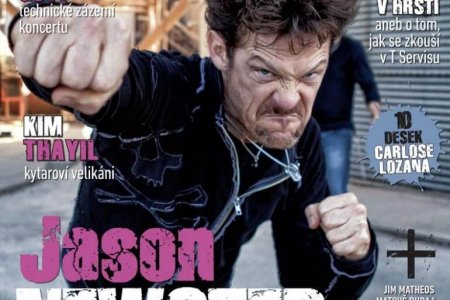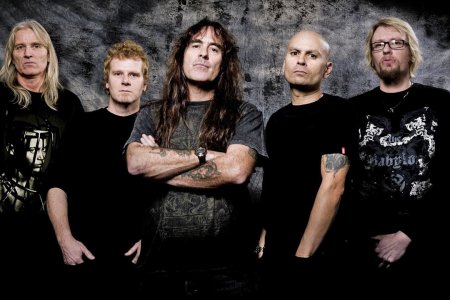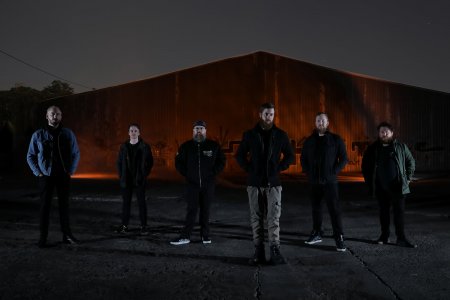American singer, guitarist and a pianist Emma Ruth Rundle doesn’t have to prove anything to anyone. She is on the scene for about fifteen years. After an interesting phase with Marriages, she is releasing high quality albums under her own name. She is cooperating with Sargent House label, she has options to cooperate with Chelsea Wolfe or her favorite band Thou. But it obviously hurts when your co-players don’t fully support your desire to record something completely different. Emma reached a point, where she is saturated with heavy music for some time. Plus she is dealing with a divorce and the only place where she can find peace is in her already complicated mind filled with doubts.
Emma is an artist I am willing to travel to Vienna or Berlin and freeze on the bus station before the transportation arrives around 3am. Her work, where she is not afraid to include even some mistakes, is packed with honest emotions. And the fact that her minimalistic album Engine of Hell demands more patience from a listener this time? I will gladly do it and I am sure, I am not the only one. For example, during the most intensive pandemic, I saw a guy in Emma Ruth Rundle’s t-shirt in a Prague’s mall. It improved my mood instantly. I complimented the t-shirt, with a simple gesture and the other side appreciated it. We wished each other a nice day and went back to our lives. Get to know Emma’s a bit more with this interview and her latest album.
This interview was originally conducted for December 2021 issue of Czech magazine Full Moon.
Update March 2022: Be sure to also check Emma’s Orpheus Looking Back EP, coming out through Sargent House on March 25. New track Pump Organ Song here.
Cover photo credit: Emma Wondra
What was your motivation to strip down the whole sound into a guitar, piano and a vocal?
There were several different sort of reasons and motivations. And then it kind of just coalesced at the time, I had been longing to make a record like Engine of Hell, for many years. I really love the approach of very bare bones stripped down music. One of my most favorite albums is Pink Moon from Nick Drake. Things that have this poignancy to them that are just extremely basic. And the way that I write music typically is in the same way, you know. It’s just a guitar and a voice. In this case, just a piano and a voice. And that’s how I play and perform when I’m on a tour without my band, which I’ve had to do a number of times, even opening for heavier acts. I did that last year with Cult of Luna. And I thought, you know, I spent more than half of my career playing this way, I’d love to make an album like this. But it just wasn’t the right time. I got in with the band that I was touring with. And we did a record, where I wanted to take an advantage of having those wonderful musicians. So I wrote On Dark Horses geared specifically to be played by those musicians. And then as that touring cycle came down, there was the Thou record, which was just like so maximally, you know, heavy for guitars, playing solos, doing all this stuff, tons of effects, screaming, singing, lots of people in the band, seven people, if you count Emily and Melissa. That’s nine people. So yeah. This just seemed like the right time to shrink the world back down. I’ve been involved with so many other people. And psychologically, things really took a turn for me. So I’d had the production concept for a while, you know, wanting to do that. Also emotionally, it just was the right time to do this record. I also believe that’s the most emotionally heavy record of my catalogue. And I think that’s what this record does. And I am aware as you said that it was going to be challenging for some people to listen to, and that there probably will be a lot of people who don’t necessarily like this record. Even within my own team, when they first heard it, it was not well received. But I think that it pays off because I spent a lot of time meticulously writing the music and I think, from an emotional perspective and from a production perspective, it accomplishes exactly what I set out to do. So I stand by it.
I feel, not only because you reached a certain phase and you accomplished many things, you have an absolute right to do what you feel in your heart and what makes sense in your perception of the world. Talking about our space, many of us spent a lot time locked during the past two years. A couple of times I went home to my family house, where I was digging in wardrobes and old memories. I heard from many people they did the same. Did you have the same experience?
I had something like that in a mental way. Because I don’t have a home, a family home. I don’t have an actual place that I can return to and look through my belongings. I’ve actually had a pretty nomadic life as an adult. But it’s interesting that you mentioned that revisiting child and adolescent time because this album definitely does that. And a lot of the things that I’m singing about are memories from coming of age and my early life in some way. I’d say probably about half the record. And for me, what took me on that journey was reconnecting with the piano. I’ve never been able to have a piano in my adult life. It was my first instrument actually. Well, the Celtic harp was my first instrument, but that didn’t last as I really stuck with the piano. My father is the pianist, and you know, I gave up on it because I started playing in bands. And keyboard did not sound good, so guitar was much easier. And it is cooler, you know. So a guitar took me on a long journey. And touring, moving around, being pretty broke. I never was able to have a piano, I never had the space, I never had my own place. And then a couple years ago, or last year, I had my own place finally. I could afford to have this piano again. And I felt I already said a lot of what I wanted to say with a guitar. As soon as I had the piano, I was just sort of channeling the musician that I was when I was younger. And a lot of those memories and those influences. Those were so tied to the experiences that I was having, when I was that age. It was just like a time machine. So I wasn’t able to actually go to a family home and look through any photo albums. But I was able to travel within myself and get reconnected with who I was when I was younger and those memories. And that definitely came and worked its way onto the album.

This just seemed like the right time to shrink the world back down
Back to effortless
How was the process from a songwriting point of view, with all of those experiences and practice behind you?
I was positively surprised how quickly I could remember stuff, I was learning twenty years ago. Like you said, getting older and learning more about music, what I’ve discovered through songwriting and playing in bands, and that I’ve learned on guitar rhythmic variations, as you were saying things that, you know, you learn with time and experience. That way my playing is better than it was twenty years ago. Just the musical experience did translate to improve my piano technique. So that was cool and exciting. I thought oh, okay, well, I guess I’ll just practice on a different instrument. Not that I’m, you know, super great at that. But there’s some facility there that does feel effortless.
What is the brand of the piano?
The piano is a Kawai. My father plays a Kawai piano too. It’s cheaper than a Yamaha. It’s made by the person who was an apprentice for the Yamaha piano builders. So the quality is just as good. But the price is twice as nice, you know? It was in the right price range.
Being a human being
Next to piano, there is a great sound of the guitar. It’s so beautiful to hear every single detail of moving over the strings. I remember, I read some time ago that especially during the 90s there were people trying to cut out the sounds of fingers moving over the strings during a production.
Some producers do try to get rid of that with the various techniques. Sometimes when you try to compress a guitar recording, it can actually make that worse. It doesn’t bother me it doesn’t, you know, when I hear it on recordings. To me, it just sounds like a human being playing an instrument. And that’s what we set out to do with this. You know, the way that those songs were tracked, it was three microphones and I’m singing. It’s an actual performance of a playing guitar and singing at the same time. There was no, you know, with the guitar songs, no overdubbing of vocal, no punching in. I mean, I guess I did overdub some harmony in Citadel and overdub, some piano and, and some other songs. But the main core of the song is a live take. And that’s why all of those things are in there. I mean, there’s a song that didn’t make it on the record at the last minute, I took it off. I love the song very much, but it just didn’t fit. I’ll release it later. But I could tell you and I know where it is, and I can hear it where my stomach is grumbling and in the tape that we chose. I don’t think it’s like super obvious, but if I played it for you, and would point it out, you might be able to hear it, but we decided to keep it because it was the best take, right? It’s a person, you know, you’re doing a thing. So I think it’s funny, but I love that. Totally looking forward to that and talking about just being a human being.
Did I hear correctly a few mistakes in the track Body?
I know exactly what you’re talking about. Yes, there are mistakes on the record. But those ones are purposeful.
I had this thought written before our interview about Phil Collins from 1985 Live Aid. He was performing a massive hit called Against All Odds and he did a very big mistake. Nothing really crazy, but you could bloody hear it. Plus on a huge event like this. On the other hand, at that moment he became a normal human being for me. It’s like even a God can make a bloody mistake.
I have to check it out. That note that you’re talking about on Body is a dissonant note that’s supposed to make you a little uncomfortable. And I’ve actually had a lot of people ask me why it is there. It sounds like a mistake and I’m okay with that. But in Blooms of Oblivion, there’s a pretty big guitar mistake. The whole main guitar track just hiccups off beat. There’s a lot of out of tune singing. And some of the lyrics on Razor’s Edge, I am saying them incorrectly. But we can pretend that piano thing was a mistake because it functions in the same way. But I think the humaneness and human error is important and it’s lacking in recordings. I think what you said when you saw Phil Collins make a mistake, it humanized him for you and that makes you connect with him even more. Have you heard a record called Colour Green from Sibylle Baier?
Unfortunately.
I think it was recorded in the 70’s. And this woman seems to have only made one record. But a lot of it was recorded in a way where you can hear that her guitar is out of tune and vocal things flawed. And it just connects. I connect with it so much because I really hear a woman in a time singing real feelings. And for me that makes it priceless. So I love that. And I wanted to take some of that and do it on this album. It was stressful, because doing live takes and trying not to make mistakes, you know, because I didn’t want it to be full of mistakes. I wanted it to be natural, but it was intense.
I will definitely check this record. When we met last time in Vienna, you recommended me Emmylou Harris. I gladly checked a couple of her live performances and I understand why she is an inspiration for you. Recently I also gladly checked a recommendation from Alexis Marshall, who was talking about Scott Walker, when I interviewed him about his latest album. Evan was helping him make it. Did he share this experience with you?
Um, you know, Evan and I are not together anymore.
I am sorry. I didn’t know that.
That’s ok. It has been over a year that we are not together. That was part of this album, you know, we split up immediately after, well, during the recording of it, basically. We’re still friends. We’re on good terms, but we don’t really speak very much because to get over our relationship, we need to really take a break from talking all the time. So yeah, I know that they’re really great friends and I think that they enjoyed that collaboration, but I probably will skip talking about him if that’s okay.
Absolutely. Sorry about that.
No worries.
Mute the judge
I would like to get back to your thought regarding dealing with musicianship mistakes. If I may, I would love to know how you got to that phase. I always want to do the best work I can whether it is for a magazine, radio or a video presentation. People around me get involved, invest their time and pressure rises. But at the end of the day, I try to say: “You did your best. It will end up somehow.” What is your approach?
How is it for me? My whole life is mistakes. I have done a lot of mistakes. I’m very well practiced at fucking things up. So I’m pretty comfortable with that, you know. I think in your situation it sounds stressful if you are not able to stop the recording and restart. It’s just an acceptance you are only human. You have done your research, you are doing people a service and I am sure people appreciate. If every artist would listen to his or her inner critic, we would have no art on the planet. At some point in your life as a creative person, you have to put that voice on the hold or dismiss it. And say: “Ok, I hear you that this is not good enough or I should change something. Thank you for sharing. I hear what you are saying, but I am going to do this anyway.” Do your best and that’s all you can really do.

I wasn’t able to go to an actual family home and look through any photo albums. But I was able to travel within myself and get reconnected with who I was when I was younger.
How do you keep that mental setting? Morning workout, meditation or one day in the mature work for me, but that’s just a theory.
I think I don’t really have any tricks. Over the course of my life I had to learn how to persevere rather than finding way to be refreshed. If I ever had some practice which would help me, it would be walking. I do really need to talk a walk every day. Other thing is really a discipline to show up and do your creative process and be present when you are trying. If you are trying to write a book, record, painting or whatever your goal is, you need to wake up and go to your desk and do that, whether you feel inspired or not. That’s my philosophy. I think when you have something you want to do, let say this record that I did, I woke up every day and wrote it. Some days are good, some days you don’t write much. Sometimes you write bunch of things that end up in the trash can. However, in order to be creative and successful as a person, I had to take away things. Let say I used to have a reward system. I will do these two hours of stressful writing and then I can go and have a drink or something. Well, that doesn’t work for me actually. Not drinking and just going for a walk instead. There were things I had to modify, how my lifestyle is, in order to stay alive, much more than refreshed. I struggle with constant pain, physical pain and mental struggles. So it’s about maintenance, lifestyle and discipline.
Understood, however after a full day hard work, I am looking forward to a nice dinner and one or two glasses of wine.
Well, if you can have one or two glasses and not one or two bottles. If I do that, it leads me to very dark places, but I believe that’s behind me.







